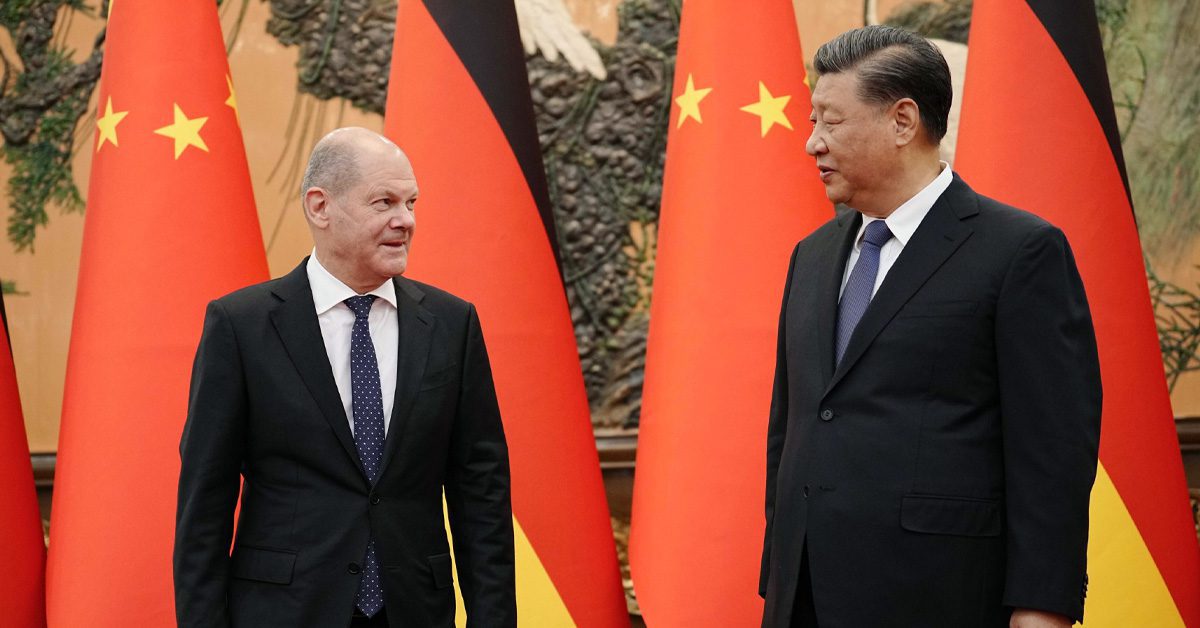German Chancellor Olaf Scholz arrived in China on Sunday, commencing a tour where he confronts a difficult balancing act as he seeks to strengthen economic ties with Berlin’s largest trade partner.
Scholz arrived in the southwestern megacity of Chongqing on Sunday morning, as reported by Chinese official broadcaster CCTV. He was accompanied by a large entourage of ministers and business leaders.
Amid Western allies increasing pressure on Beijing, Scholz is expected to emphasize Germany’s commitment to conducting business with the world’s second-largest economy and resisting US-led proposals for “decoupling.”
His friendlier overtures to China risk infuriating Washington and its European allies, who have been protesting against Beijing’s generous industrial subsidies.
“China remains a crucial economic partner,” Scholz told reporters on Friday, adding that he will work to level the playing field for German firms in China.
On the geopolitical front, Scholz will use his visit to persuade Chinese President Xi Jinping to leverage his influence to rein in Russian President Vladimir Putin and assist in resolving the conflict in Ukraine.
“Given the close ties between China and Russia, Beijing has an opportunity to exert its influence on Russia,” said a German government official in Berlin.
Scholz’s three-day tour of Chongqing, Shanghai, and Beijing marks his second visit to China since taking office.
His first visit to China, in November 2022, was closely watched as it came shortly after Xi consolidated his hold on power and was the first post-pandemic visit by a G7 leader.
Western allies have been rushing to minimize their reliance on Beijing after experiencing severe supply chain interruptions during the health crisis, as well as China’s failure to distance itself from Russia in the face of Moscow’s invasion of Ukraine.
Scholz’s visit comes as several of Germany’s Western partners are grappling with China on various trade issues.
A flurry of investigations into state subsidies for Chinese solar panels, electric vehicles, and wind turbines is underway in Brussels.
Meanwhile, the United States is investigating the national security risks posed by Chinese automotive technology. With tensions over Taiwan escalating, US President Joe Biden made security assurances to Japan and the Philippines this week, while condemning Beijing’s actions in the South China Sea as “dangerous and aggressive.”
Scholz spoke with French President Emmanuel Macron two days before his visit, according to his office, and the two leaders “coordinated efforts to advocate for a rebalancing of European-Chinese trade relations.”
However, China remains an important market for Germany, as many jobs rely directly on demand from the Asian powerhouse.
Both economies are in need of a boost.
Last year, the German economy contracted by 0.3% due to inflation, high interest rates, and slowing exports, and the economics ministry predicts only a 0.2% gain this year. Beijing has targeted an annual GDP growth rate of roughly 5% for this year, although exports fell more than expected last month.
German MPs and analysts have urged Scholz to adopt a firmer stance.
Deborah Duering of the Green Party advised Scholz not to view China solely as an economic opportunity.
“Those who ignore the long-term risks for short-term financial gains risk repeating the mistakes of the past, such as the misguided Russia policy,” Duering warned, referring to the country’s previous reliance on Moscow for cheap energy supplies.
Max Zenglein of the Mercator Institute for China Studies believes Germany should take a more proactive approach.
“As countries like the USA and Japan are preparing more aggressively against China, Germany has a significant role to play,” he said, adding that the country was “in a position of strength.”

